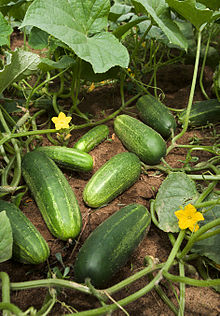Cucumber
| Cucumber | |
|---|---|
 |
|
| Cucumbers growing on vines | |
 |
|
| Scientific classification | |
| Kingdom: | Plantae |
| (unranked): | Angiosperms |
| (unranked): | Eudicots |
| (unranked): | Rosids |
| Order: | Cucurbitales |
| Family: | Cucurbitaceae |
| Genus: | Cucumis |
| Species: | C. sativus |
| Binomial name | |
|
Cucumis sativus L. |
|
| NCBI genome ID | 1639 |
|---|---|
| Ploidy | diploid |
| Genome size | 323.99 Mb |
| Sequenced organelle | mitochondrion |
| Organelle size | 244.82 Mb |
| Year of completion | 2011 |
| Nutritional value per 100 g (3.5 oz) | |
|---|---|
| Energy | 65 kJ (16 kcal) |
|
3.63 g
|
|
| Sugars | 1.67 |
| Dietary fiber | 0.5 g |
|
0.11 g
|
|
|
0.65 g
|
|
| Vitamins | |
| Thiamine (B1) |
(2%)
0.027 mg |
| Riboflavin (B2) |
(3%)
0.033 mg |
| Niacin (B3) |
(1%)
0.098 mg |
| Pantothenic acid (B5) |
(5%)
0.259 mg |
| Vitamin B6 |
(3%)
0.04 mg |
| Folate (B9) |
(2%)
7 μg |
| Vitamin C |
(3%)
2.8 mg |
| Vitamin K |
(16%)
16.4 μg |
| Minerals | |
| Calcium |
(2%)
16 mg |
| Iron |
(2%)
0.28 mg |
| Magnesium |
(4%)
13 mg |
| Manganese |
(4%)
0.079 mg |
| Phosphorus |
(3%)
24 mg |
| Potassium |
(3%)
147 mg |
| Sodium |
(0%)
2 mg |
| Zinc |
(2%)
0.2 mg |
| Other constituents | |
| Water | 95.23 g |
| Fluoride | 1.3 µg |
|
|
|
|
|
| Percentages are roughly approximated using US recommendations for adults. | |
Cucumber (Cucumis sativus) is a widely cultivated plant in the gourd family, Cucurbitaceae. It is a creeping vine that bears fruits that are used as vegetables. There are three main varieties of cucumber: slicing, pickling, and seedless. Within these varieties, several cultivars have been created. In North America, the term "wild cucumber" refers to plants in the genera Echinocystis and Marah, but these are not closely related. The cucumber is originally from South Asia, but now grows on most continents. Many different types of cucumber are traded on the global market.
The cucumber is a creeping vine that roots in the ground and grows up trellises or other supporting frames, wrapping around supports with thin, spiraling tendrils. The plant may also root in a soilless medium and will sprawl along the ground if it does not have supports. The vine has large leaves that form a canopy over the fruits. The fruit of typical cultivars of cucumber is roughly cylindrical, but elongated with tapered ends, and may be as large as 60 centimeters (24 in) long and 10 centimeters (3.9 in) in diameter. Botanically speaking, the cucumber is classified as a pepo, a type of botanical berry with a hard outer rind and no internal divisions. Much like tomato and squash, it is often perceived, prepared and eaten as a vegetable. Cucumber fruits are usually more than 90% water.
A few cultivars of cucumber are parthenocarpic, the blossoms creating seedless fruit without pollination. Pollination for these cultivars degrades the quality. In the United States, these are usually grown in greenhouses, where bees are excluded. In Europe, they are grown outdoors in some regions, and bees are excluded from these areas.
...
Wikipedia
